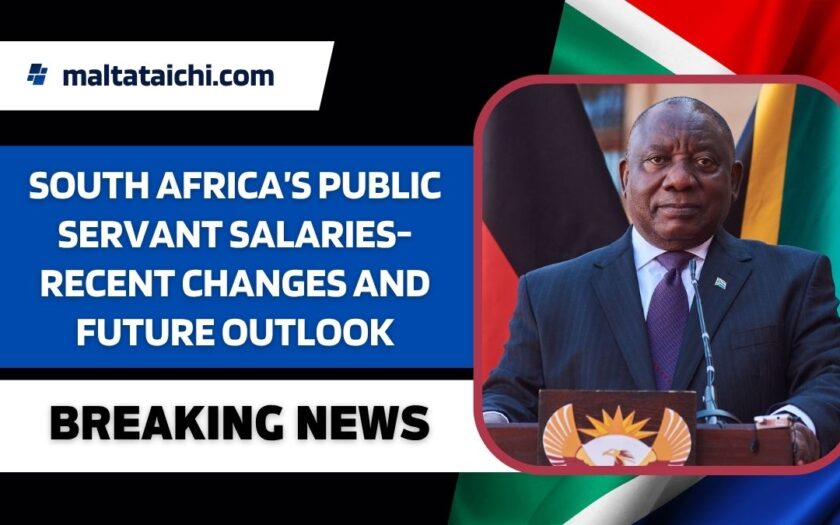South Africa’s public servant salary landscape has undergone notable shifts in recent years, driven by economic challenges, inflation, and government policies. As 2025 approaches, many public sector employees are questioning how their compensation will evolve.
This article delves into the history of salary adjustments for public servants, shedding light on the factors influencing pay scales, and provides insights into what public servants can expect in the coming years.
Recent Salary Changes and Economic Impact
In response to persistent economic pressures, the South African government has made efforts to ensure fair wages for public servants.
However, several factors—such as inflation rates, union negotiations, and overall economic conditions—determine salary increases each year. The adjustments reflect both local and global financial climates.
For 2025, public sector salaries are expected to see an increase of 5.5%, with inflation easing to 4.4% in 2024, offering some relief for public servants.
Despite this increase, the real income growth is expected to be modest, with a net gain of just 1% after factoring in inflation.
Factors Influencing Salary Adjustments
Inflation and Economic Pressures
Inflation plays a central role in determining salary adjustments. In 2023, South Africa experienced significant inflationary pressures, leading to modest salary increases in 2024.
As inflation decreased to 4.4% in 2024, the government seized the opportunity to adjust salaries accordingly, giving public servants a slight real income boost.
Wage Negotiations with Trade Unions
Wage discussions are integral to shaping the compensation of public servants. Trade unions are at the forefront of negotiating salary increases, especially during times of economic hardship.
In 2024 and 2025, unions successfully pushed for a 5.5% salary hike, though there are still calls for further improvements in pay equity across various public service sectors.
What to Expect for 2025 and Beyond
Salary Increase Trends
For 2025, public servant salaries are anticipated to rise by 5.5%, aligning with inflation projections. However, the real income growth will likely remain limited, hovering around 1% due to inflation.
Government’s Fiscal Constraints
South Africa’s public debt, now exceeding 70% of GDP, exerts pressure on the government’s ability to increase public spending.
This debt situation has led to a more cautious approach in approving salary hikes, making large increases less likely in the immediate future.
Cost of Living Considerations
The cost of living in South Africa plays a crucial role in salary discussions. While a 5.5% salary increase may seem beneficial, inflation at 4.4% means public servants will only see a real purchasing power increase of about 1%, not enough to offset the rising costs of everyday goods and services.
Practical Advice for Public Servants in 2025
1. Focus on Budgeting
With modest salary adjustments, it is crucial for public servants to prioritize their spending. Implementing a budgeting strategy that focuses on essential expenses and reduces discretionary spending will help ease financial stress.
2. Invest in Skills Development
Although salary increases may be limited, focusing on skills development can enhance career opportunities and earning potential. Pursuing further education, certifications, or specialized training in fields like IT, engineering, or finance could lead to better-paying roles within the public sector.
3. Understand Your Benefits
In addition to salaries, many public servants enjoy substantial benefits such as pensions, healthcare, and paid leave. These benefits can provide long-term financial security and may even surpass the value of salary increases in some cases.
4. Stay Informed
Public servants should remain updated on government wage negotiations, policy changes, and economic forecasts. Staying informed will help workers navigate potential changes that could impact salaries and benefits.
The landscape of public servant salaries in South Africa has been shaped by inflationary trends, economic challenges, and ongoing government wage negotiations. While salary increases are on the horizon for 2025, the real income growth will likely be modest.
Public servants will need to focus on budgeting, skills development, and understanding their benefits to ensure financial stability amidst the challenges ahead.
FAQs
What is the expected salary increase for South African public servants in 2025?
The expected salary increase for 2025 is 5.5%, although the real income growth after accounting for inflation is only about 1%.
How does inflation impact salary increases for public servants?
Inflation directly affects the real purchasing power of salaries. Even with a 5.5% increase, inflation at 4.4% means that public servants will experience only a 1% improvement in their real income.
Why is there a cap on public servant salary increases in South Africa?
Due to the country’s public debt exceeding 70% of GDP, the government faces significant fiscal constraints that limit the ability to grant large salary increases, ensuring that public spending remains sustainable.




